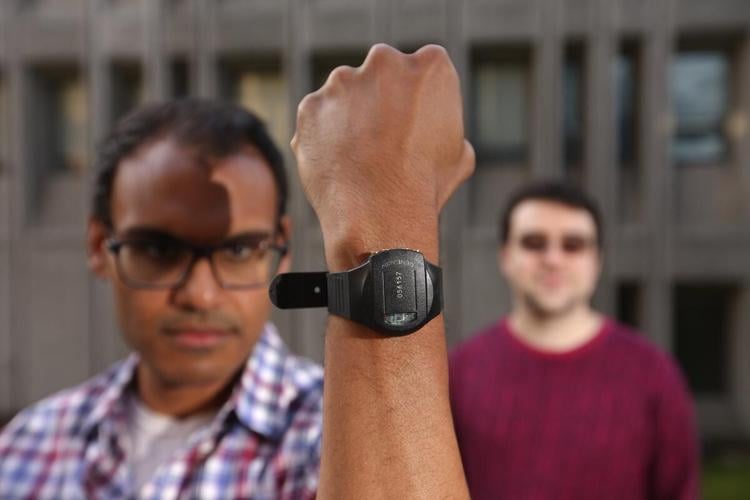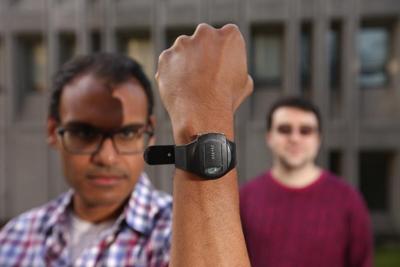The battle to get a good nightŌĆÖs rest is likely a familiar one for many of us. Frustrating disruptions like waking up in the middle of the night, to having trouble falling asleep in the first place are commonplace, especially if weŌĆÖre feeling stressed or anxious.
But with the help of advancements in sleep-tracking technology, a team of Canadian scientists determined that sleep troubles are a very common symptom of mental illness, regardless of diagnosis ŌĆö a revelation that sheds new light on the two-way relationship between quality of sleep and overall mental health.
ŌĆ£In a nutshell, we found that people who have ever been diagnosed with a mental illness in their lifetime tended to have changes in their sleep patterns, usually for the worse,ŌĆØ said Dr. Michael Wainberg, a post-doctoral researcher at the Centre for Addiction and Mental HealthŌĆÖs (CAMH) Krembil Centre for Neuroinformatics and lead author of the study.

Dr. Michael Wainberg, left, and Dr. Shreejoy Tripathy conducted the largest study of sleep and mental illness of its kind, looking at the sleep patterns of thousands of people.
Steve RussellWhile it is well-known that poor sleep tends to result in poor mental health and vice-versa, this new study, , is the largest and most advanced to date.
Using a one-of-a-kind biobank filled with an array of health data from about half-a-million people in the United Kingdom, researchers from CAMH were able to monitor the sleep patterns of more than 89,000 study participants in their own homes. They did so using an accelerometer, a movement tracking device worn on the wrist of participants that provides data helpful in measuring metrics like length of sleep, or whether someone wakes up in the middle of the night and for how long.
The findings provide a comprehensive look at how commonplace sleep disruptions are among people with a mental illness diagnosis, from depression and anxiety to bipolar disorder and schizophrenia, and could lead the way in understanding whether targeted measures to improve sleep could help in overall treatment of mental illness, as there are actions people can take to better their sleep.
ŌĆ£In psychiatry, thereŌĆÖs a lot of things that we canŌĆÖt measure. We canŌĆÖt measure how a person thinks or feels,ŌĆØ said Dr. Michael Mak, a staff psychiatrist at CAMH with a focus on sleep medicine. ŌĆ£Sleep is a factor that we can objectively measure.ŌĆØ
Previously, most sleep research was conducted in a lab, said Dr. Shreejoy Tripathy, a scientist at CAMH and a senior author of the study. He added using the U.K. Biobank has opened doors for utilizing similar technology in Canada for research through CAMHŌĆÖs BrainHealth Databank, a digital information database that already compiles health data and metrics from patients to help develop personalized treatment options for them.
ŌĆ£ItŌĆÖs really just an unbelievably massive undertaking,ŌĆØ Tripathy said of the U.K. Biobank, which is funded by an array of public and private sectors in the country, including the National Health Service and pharmaceutical companies like AstraZeneca.
Tripathy added it would be impossible for one research team to gather timely data on sleep from this many participants without the biobank, but with the help of similar technology closer to home, Tripathy will begin compiling data on sleep from Canadian patients in the coming months using similar wearable devices to the one used in the U.K.
The studyŌĆÖs findings were compiled by looking at sleep data gathered from 2013 to 2015 over a seven-day period. Most of the participants did not have a mental illness diagnosis, but their results were contrasted with those of 2,480 participants who were diagnosed with a mental disorder.
For people with a diagnosed mental illness, the average time slept in a night was six hours and three minutes, versus a slightly longer six hours and 42 minutes for people without a diagnosis. The studyŌĆÖs results also showed that people with mental health disorders wake up more often in the middle of the night, and it takes them longer to fall asleep.
Less sleep, Mak said, could lead to depression and anxiety symptoms, while developing depression in and of itself could lead to insomnia and disrupted sleep. Knowing this relationship between sleep and mental health, treatments for sleep quality, like cognitive behavioural therapy for insomnia, may decrease peopleŌĆÖs levels of depression or other mental health issues.
ŌĆ£By improving sleep, we can also improve someoneŌĆÖs mood and maybe other mental health disorders as well,ŌĆØ Mak said.
While the data for this study was compiled a few years ago, more recent data collection during the COVID-19 pandemic shows due to stress and loss of routine. While sleep habits are generally improving, Mak said, there are a few things people could do to monitor their sleep and determine whether itŌĆÖs being disrupted significantly.
First, people could monitor the time it takes for them to fall asleep. ŌĆ£If you were somebody who fell asleep within half an hour, and now it takes you an hour to fall asleep, then there might be something going on from a mental health perspective,ŌĆØ Mak said. Second, people should monitor if they are waking up in the middle of the night, and whether those awakenings are happening more frequently.
Lastly, Mak said people can reflect on their overall quality of sleep. ŌĆ£After having slept all night, do I feel good in the morning? Do I feel refreshed? If I still feel drowsy, then there might be an issue.ŌĆØ
Overall, the researchers credited the advancement of wearable technology, like Fitbits and Apple Watches, in helping identify the relationship between mental health and sleep on a larger scale. While sleep-tracking technology has been around for some time, itŌĆÖs only become more affordable recently, Mak said.
ŌĆ£If people measure their sleep at home with those devices, then there may be a window for them to identify if thereŌĆÖs something brewing from a mental health perspective that needs to be addressed,ŌĆØ Mak said.
ŌĆ£ItŌĆÖs tremendous, because it gives us another avenue to assess whether people are getting sick or not.ŌĆØ




























To join the conversation set a first and last name in your user profile.
Sign in or register for free to join the Conversation